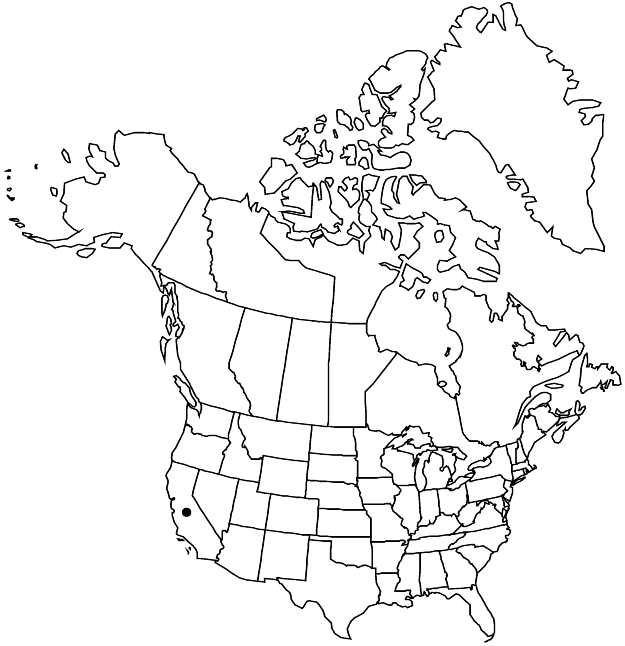Difference between revisions of "Eriogonum siskiyouense"
Bull. Torrey Bot. Club 25: 44. 1898.
FNA>Volume Importer |
imported>Volume Importer |
||
| (4 intermediate revisions by one other user not shown) | |||
| Line 8: | Line 8: | ||
}} | }} | ||
|common_names=Siskiyou wild buckwheat | |common_names=Siskiyou wild buckwheat | ||
| + | |special_status={{Treatment/ID/Special_status | ||
| + | |code=E | ||
| + | |label=Endemic | ||
| + | }} | ||
|basionyms= | |basionyms= | ||
|synonyms={{Treatment/ID/Synonym | |synonyms={{Treatment/ID/Synonym | ||
|name=Eriogonum ursinum var. siskiyouense | |name=Eriogonum ursinum var. siskiyouense | ||
|authority=(Small) S. Stokes | |authority=(Small) S. Stokes | ||
| + | |rank=variety | ||
}} | }} | ||
|hierarchy=Polygonaceae;Polygonaceae subfam. Eriogonoideae;Eriogonum;Eriogonum subg. Oligogonum;Eriogonum siskiyouense | |hierarchy=Polygonaceae;Polygonaceae subfam. Eriogonoideae;Eriogonum;Eriogonum subg. Oligogonum;Eriogonum siskiyouense | ||
| Line 36: | Line 41: | ||
-->{{#Taxon: | -->{{#Taxon: | ||
name=Eriogonum siskiyouense | name=Eriogonum siskiyouense | ||
| − | |||
|authority=Small | |authority=Small | ||
|rank=species | |rank=species | ||
| Line 50: | Line 54: | ||
|publication title=Bull. Torrey Bot. Club | |publication title=Bull. Torrey Bot. Club | ||
|publication year=1898 | |publication year=1898 | ||
| − | |special status= | + | |special status=Endemic |
| − | |source xml=https:// | + | |source xml=https://bitbucket.org/aafc-mbb/fna-data-curation/src/2e0870ddd59836b60bcf96646a41e87ea5a5943a/coarse_grained_fna_xml/V5/V5_722.xml |
|subfamily=Polygonaceae subfam. Eriogonoideae | |subfamily=Polygonaceae subfam. Eriogonoideae | ||
|genus=Eriogonum | |genus=Eriogonum | ||
Latest revision as of 22:13, 5 November 2020
Herbs, spreading, matted, 0.5–2 × 1–5 dm, glabrate or glabrous. Stems: caudex spreading; aerial flowering stems erect, slender, solid, not fistulose, arising at nodes of caudex branches and at distal nodes of short, non-flowering aerial branches, 0.5–1.5(–2) dm, usually glabrous, with a whorl of 2–4 leaflike bracts ca. midlength, similar to leaf blade, 0.3–0.5 × 0.1–0.2 cm. Leaves in dense compact basal rosettes; petiole 0.2–0.6 cm, glabrate or glabrous; blade spatulate to round, (0.3–)0.5–0.8 × (0.2–)0.3–0.5(–0.7) cm, densely white to thinly tomentose abaxially, sparsely floccose to glabrate and green or olive green adaxially, rarely glabrous on both surfaces, margins entire, plane. Inflorescences capitate, rarely umbellate, 0.8–1.5 cm wide or 1–2 × 1–3 cm; branches usually glabrate; bracts absent immediately below involucre. Involucres 1 per node, turbinate-campanulate to campanulate, (3–)3.5–4 × 4–6 mm, arachnoid-tomentose; teeth 6–10, lobelike, reflexed, (2–)2.5–3.5 mm. Flowers (4–)4.5–6 mm, including 0.6–1 mm stipelike base; perianth sulphur yellow, glabrous; tepals monomorphic, oblong; stamens exserted, 3.5–5 mm; filaments pilose proximally. Achenes light brown, 4.5–5 mm, glabrous.
Phenology: Flowering Jul–Sep.
Habitat: Gravelly serpentine slopes and outcrops, manzanita communities, montane conifer woodlands
Elevation: 1600-2800 m
Discussion
Eriogonum siskiyouense is restricted to the ridge system that extends from the Scott Mountain area to the Mt. Eddy region of Siskiyou and Trinity counties. The vast majority of individuals in a population have a single involucre atop each flowering stem, but at lower elevations and in somewhat more protected sites the inflorescence may be umbellate. The Siskiyou wild buckwheat does well in cultivation if its soil requirements are fulfilled.
Selected References
None.
